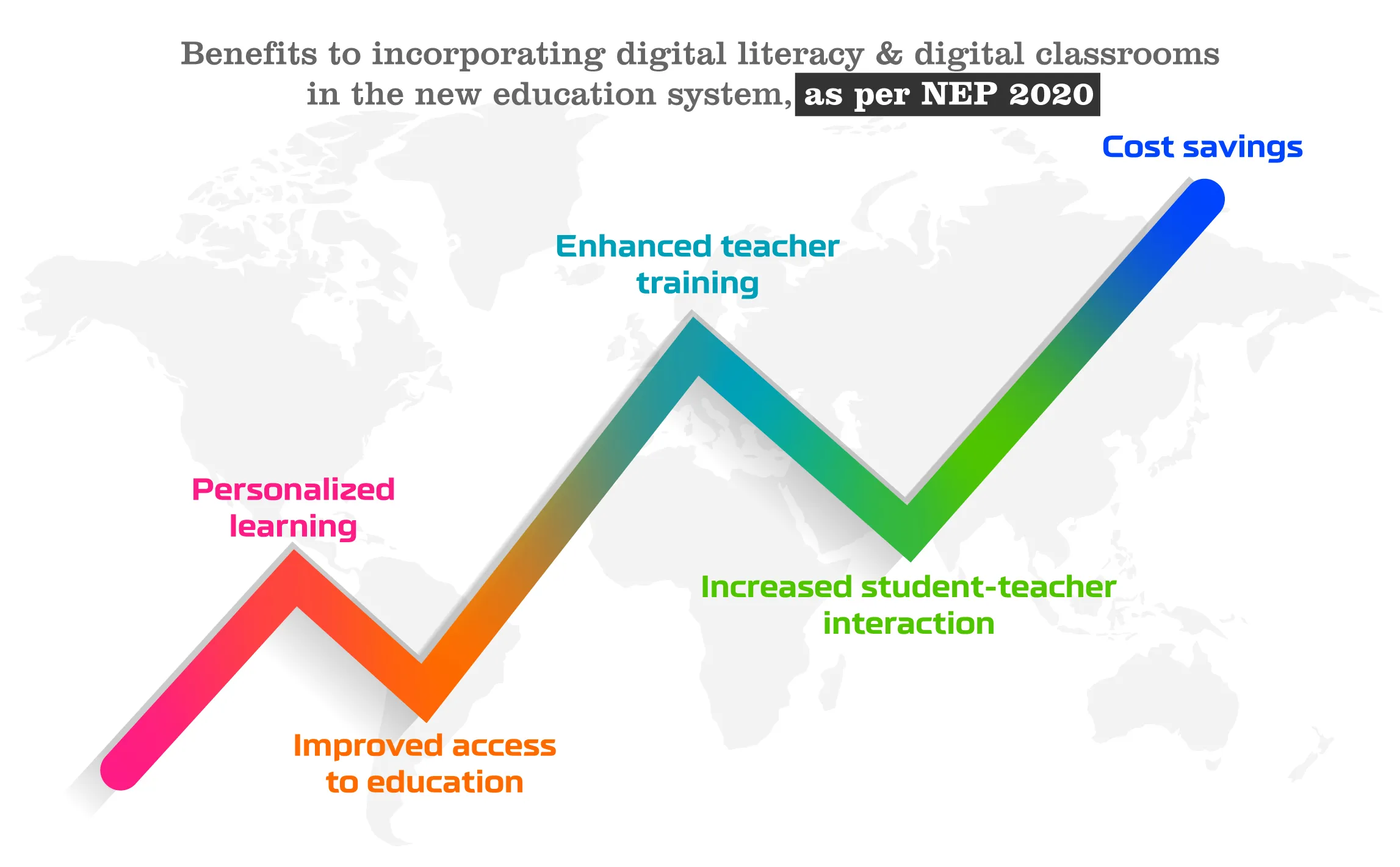
The National Education Policy (NEP) 2020, a major reform in the Indian education sector, aims to revamp the education system and make it more inclusive, equitable, and futuristic. As part of this reform, the NEP emphasizes the importance of digital literacy and the use of technology, including digital classrooms, to enhance the quality of education and improve student outcomes.

Digital literacy refers to the ability to use technology effectively, including digital devices, software, and online resources, to access, create, and communicate information. In the new education system, digital literacy is considered as a crucial 21st-century skill that all students should possess to succeed in a rapidly changing digital world.
Digital classrooms, on the other hand, are classrooms that utilize technology, such as computers, laptops, tablets, and the internet, to enhance the teaching and learning process. Digital classrooms provide students with access to a wealth of online resources and tools, such as videos, simulations, games, and assessments, that can make learning more engaging and interactive.
There are several benefits to incorporating digital literacy and digital classrooms in the new education system, as per NEP 2020:
Personalized learning:
Digital classrooms provide teachers with the ability to tailor their teaching to individual student needs and preferences. This can result in improved student engagement and motivation, and increased learning outcomes.
Improved access to education:
Digital classrooms provide students with access to quality education, regardless of their location or financial background. This can reduce the gap between urban and rural schools and improve access to education for students with disabilities.
Enhanced teacher training:
Digital classrooms provide teachers with the tools to enhance their skills and knowledge, through online courses, professional development, and peer-to-peer learning.
Increased student-teacher interaction:
Digital classrooms provide students with the opportunity to communicate with their teachers, receive real-time feedback, and participate in online discussions.
Cost savings:
Digital classrooms eliminate the need for traditional textbooks and reduce the cost of printing and distribution. They also save time, as teachers can create and manage online courses and assessments more efficiently.
However, there are also challenges associated with the adoption of digital literacy and digital classrooms in the new education system, as per NEP 2020. These include:
Lack of digital literacy among teachers and students:
Many teachers and students may not be familiar with technology and the use of digital classrooms, which can limit their effectiveness.
Limited access to technology in rural areas:
There may be limited access to technology, particularly in rural areas, which can hinder the implementation of digital classrooms.
Lack of infrastructure and support:
Schools and colleges may lack the necessary infrastructure, such as computers and internet access, to support the implementation of digital classrooms.
Resistance to change:
Teachers and students may resist the adoption of digital classrooms, as it requires a shift in traditional teaching and learning methods.
Cost:
Implementing digital classrooms can be expensive, and schools and colleges may lack the necessary budget to invest in the technology.
In conclusion, the NEP 2020 recognizes the importance of digital literacy and digital classrooms in the new education system. These tools provide students with access to quality education, improve student outcomes, and prepare them for the digital world. However, it is important to address the challenges associated with their adoption to ensure their effective implementation and success.
#NEP2020 #DigitalLiteracy #DigitalClassrooms #EduTech #EducationReform #OnlineLearning #FutureReadySkills #InnovativeEducation #TeacherTraining #StudentEngagement #QualityEducation #AccessibleEducation #21stCenturySkills #DigitalCitizenship #StudentSuccess #OnlineEducation #EmpoweringTeachers #EnhancingLearningOutcomes #DigitalTransformation #InclusiveEducation #EquitableEducation #FuturisticEducation #TechnologyInEducation #LearningWithTechnology #ImprovingEducationWithTech